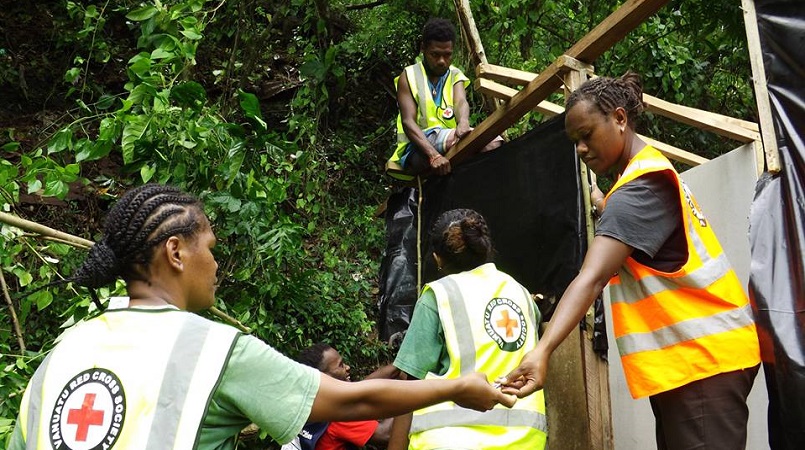
Vanuatu Red Cross Society (VRCS) staffs and volunteers participated in a three days reflection workshop in Port Vila to develop a Multi hazard National Contingency Plan for the National Society.
Representing the Red Cross branches are Shirley Johnson Sanma Branch Manager and Tensly Tar as Penama Part time officer, Shefa Branch volunteers as well as staffs from the Headquarter Disaster team, Communication and Planning Monitoring Evaluation Reporting team, and Finance team.
“Contingency Plan is like a backup plan based on specific scenarios and pre identified preparedness and response actions where VRCS to rely on during a Disaster operation. The reason why we are developing this plan is because Vanuatu is ranked No 1 as Prone disaster country in the world, as a Country we are facing multipole hazards occurring annually that varies from Cyclone, Earthquake, Tsunami, Landslide, flooding, Drought, Volcano, and it is the mandate of Vanuatu Red Cross Society to respond to any disasters” explained Augustin Garae, Disaster Management Coordinator at VRCS.
He stated that, having all staff and volunteers all together during the workshop, is critical contribution towards the development of this multihazard contingency plan.
“This is a new approach we undertake to develop a common understanding to help us to respond to disaster in a timely and effective manner. It reinforces and clarifies coordination of roles and responsibilities, improve relationships and coordination withing the Red Cross as well as with external stakeholders and partners. Other reasons are, we can make adequate arrangements and identify constraints in advance, and manage time pressure faced during disasters” stated Garae.
He highlighted that VRCS has an overall disaster response plan, however VRCS with the assistance of International Federation of Red Cross Red Crescent (IFRC) saw the need to develop a multi-hazard contingency plan to prepare VRCS to respond well to an emergency and its potential humanitarian impact based on anticipatory specific hazard and specific events or known risks at local, national regional or even global levels(e.g earthquakes, floods or disease outbreaks) and establish operation procedures for response, based on expected resource requirements capacity in three different scenarios (best case , most likely and worst).
The workshop is facilitated by Lemau Afamasaga - Disaster Preparedness &Operation Manager, and Miss Dewindra Widiamurtri – health manager for the IFRC Country Cluster Support team based in Fiji.
It is expected that the Multi Hazard National Contingency Plan will be finalised at the end of this year and will be shared to VRCS partners and stakeholders as well as the National Government.
Photo Vanuatu Red Cross Caption: Red Cross volunteers are amongst the first responders in times of disasters
